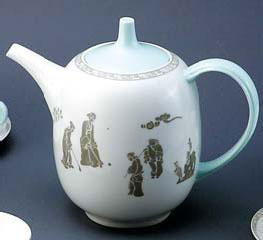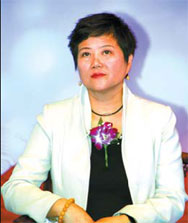What's new
Celine Dion: I'm against Games boycott

Canadian pop star Celine Dion has voiced support for the upcoming Beijing Olympic Games, saying she was "definitely against boycotting" the Games.
"When you talk about the Olympics, you don't say politics," she said at a press conference in Beijing on Saturday.
"We talk about power. We talk about love. And we talk about dreams."
Dion and husband Rene Angelil were in the city for a TV program after her concert in Shanghai on Friday. On the program, the Quebec native sang the Power of the Dream, the theme song of the 1996 Atlanta Olympic Games.
Dion called on all people to "keep the dream possible for our young kids".
On finding that the name of the sculpture given to her as a gift by Zhao Dongming, director of the Beijing Organizing Committee for the Olympic Games cultural activities department, was "eternal flame", Dion said "keep the flame eternal."
She expressed regret that she would not be able to watch the Games in August as she would be busy with her world tour concerts.
"My heart belongs here," she said, adding that she firmly believed there would be a successful Olympic Games in the summer.
The singer said she almost switched to athletics because of the "power" of the Olympics.
She was 8 years old when she watched the 1976 Montreal Olympic Games where Romanian gymnast Nadia Comeneci was awarded a perfect 10.
"I had till then always wanted to be a singer. But when I saw Comeneci performing, I wanted to become an athlete. Olympics is something to dream about."
Tea set with a twist

Renowned artists Zhang Shouzhi and Lu Peixin have created a series of porcelain coffee/tea sets decorated with images depicting vivid scenes of ancient Chinese sports.
These five sports are Cu Ju (similar to soccer), Chui Wan (similar to baseball), Tie Jian (shuttlecock kicking), Tou Hu (pitch-pot game in which participants throw arrows into a pot), and Ma Qiu (similar to equestrian polo).
The ceramic sets, entitled Five Continents in Harmony, include elegantly shaped, delicate pots, cups and trays made with the best Gu Ci (bone porcelain) techniques from Zibo, in Shandong province.
With unique designs and carefully painted patterns, the porcelain sets refer to such Chinese philosophical ideas as the Five Essential Elements of metal, wood, water, fire and earth, and five directions of East, West, South, North and Middle, as well as the five rings of the Olympic Games, designers say.
Under the supervision of the National Art Museum of China, the China National Arts & Crafts Corp has produced a limited edition of 1,000 sets of the ceramic artworks, each set numbered with a specific Chinese character from the text of Qian Zi Wen, a 1,000-word classic Chinese poem.
About 10 leading museums from China and abroad including the National Museum of China, Shenyang Palace Museum and the Chicago Field Museum of Natural History, have each received a set of the porcelain art, according to Zhang Hong, head of China National Arts & Crafts Corp.
Plague fighter in the spotlight
Singapore-based TV network Channel News Asia will screen a documentary named Plague Fighter Dr Wu Lien-teh at 7:30 pm on April 13 and 20.
Using old photos, footage and interviews, the documentary recalls the life of Dr Wu, who, at 31, implemented measures to fight the pneumonia plague which threatened northern China, and claimed 60,000 lives at the turn of the 20th century. Wu was also known for his efforts to modernize China's medical services, by helping establish some 20 modern hospitals, laboratories and research institutions, including the Peking Union Medical College Hospital. He also founded the Chinese Medical Association and established the first national quarantine service.
Classic text gets a makeover

Director Hu Mei says that her new project A Dream of the Red Chamber (Honglou Meng), an adaptation of the classic Chinese novel, will primarily be a love story.
Hu says the story will focus on the relationship between Jia Baoyu, Lin Daiyu and Xue Baochai, the three main characters. The director also says that she wants to use unknown actors for the roles.
The film will be show in a studio to be built in Huairou district, in suburban Beijing. The set will be based on the book's description of Daguanyuan Garden, where the main story takes place.
Of the various adaptations of the classic novel, a TV series broadcast in 1987 remains the most popular. In 2007, a TV show offered contestants the chance to compete for a part in Wu's new adaptation, however, the director made it clear that she would not cast actors from any talent show.
China Daily
(China Daily 04/15/2008 page18)














